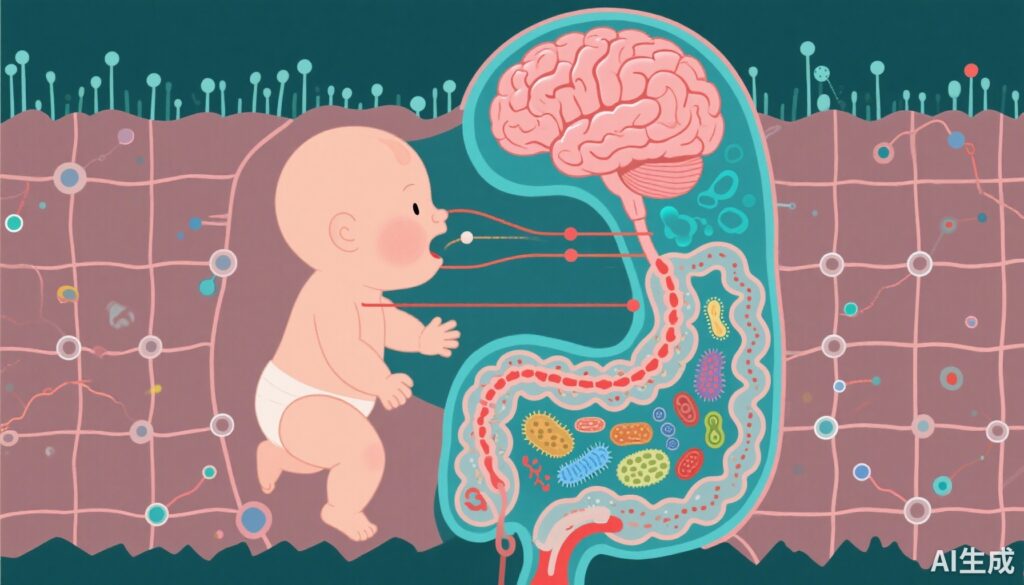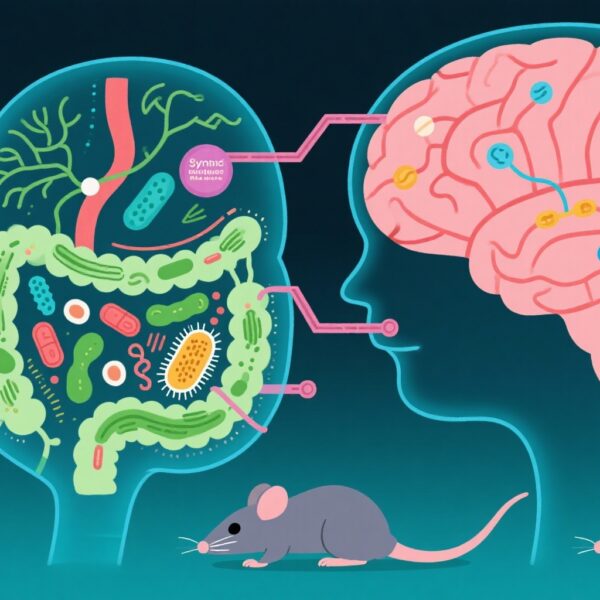Highlight
- The maturity of the early-life gut microbiome critically regulates blood-brain barrier (BBB) permeability during brain development.
- Full-term infant-derived microbiota enhances cognitive outcomes and BBB integrity compared to preterm-derived microbiota in murine models.
- Single-cell RNA sequencing reveals that prematurity-associated microbiota downregulates synaptic signaling genes in BBB cells.
- Metagenomics and metabolomics identify specific bacterial populations and metabolic pathways linked to neurodevelopmental benefits.
Study Background and Disease Burden
The gut microbiome is increasingly recognized as an influential factor in brain health and disease pathogenesis, especially in neurodevelopment. Integrity of the blood-brain barrier (BBB) is essential for maintaining brain homeostasis, protecting against neurotoxins, and regulating molecular transport crucial for cognitive development. Premature birth remains a significant global health challenge, frequently associated with neurodevelopmental impairments, including cognitive deficits and increased risk for neuropsychiatric disorders. However, the mechanisms by which prematurity affects brain development are incompletely understood. Emerging evidence implicates early-life gut microbiome composition and maturity as a key modulator of neurodevelopmental trajectories. Understanding these microbial influences on BBB function and cognition might offer novel avenues for therapeutic intervention, particularly for vulnerable preterm populations at risk of long-term neurologic sequelae.
Study Design
This translational animal study employed germ-free pregnant mice colonized with human-derived gut microbiota obtained from either full-term or preterm infants. Colonization was established in utero to simulate early microbial exposure and developmental maturation. Offspring were subsequently studied to assess the influence of these distinct microbiomes on BBB permeability and cognitive parameters. Behavioral assays evaluated memory and learning capabilities. Whole-brain single-cell RNA sequencing was performed to analyze transcriptional changes within BBB-associated endothelial and glial cell populations. Complementary metagenomic sequencing and untargeted metabolomic profiling characterized bacterial taxa and metabolic signatures linked to neurodevelopmental outcomes.
Key Findings
Mice harboring a full-term infant-derived microbiota exhibited enhanced memory and learning in behavioral tests compared to those colonized with a prematurity-associated microbiome. This cognitive advantage correlated with markedly reduced BBB permeability during early life, suggesting improved barrier integrity. The prematurity-associated microbiome was linked to increased early-life BBB leakiness, a known risk factor for neuroinflammation and impaired neurodevelopment.

Fig. Compared to those colonized with the full-term infant microbiome, mice colonized with the preterm infant microbiome exhibit behavioral deficits.
Single-cell RNA sequencing revealed that BBB cell types from mice with the prematurity-related microbiome demonstrated significant downregulation of synaptic signaling gene expression, implicating altered neurovascular unit function and impaired neurocognitive development. These transcriptional changes underscore the microbiome’s role in modulating endothelial and glial signaling pathways essential for BBB homeostasis and synaptic connectivity.

Fig. Mice colonized with the full-term infant microbiome display lower brain-wide BBB permeability in early life.
Metagenomic profiling identified key differences in bacterial populations: mice with the full-term microbiome showed enrichment of taxa associated with beneficial metabolic functions. Correspondingly, metabolomic analyses revealed decreased levels of circulating long-chain acylcarnitines and lysophosphatidylcholines in the full-term group. These metabolites have been implicated in neuroinflammation and mitochondrial dysfunction, suggesting that microbial metabolic modulation contributes to BBB integrity and cognitive development.
Collectively, these results demonstrate that the maturity and composition of the early-life gut microbiota profoundly influence BBB function and cognitive outcomes, highlighting microbial metabolites as potential mediators.
Expert Commentary
This study provides compelling evidence linking neonatal gut microbiome maturity to fundamental neurodevelopmental processes including BBB integrity and synaptic gene regulation. The use of human-derived microbiota in germ-free animal models enhances translational relevance, although extrapolation to human infants warrants cautious interpretation considering species differences and environmental factors.
The identification of downregulated synaptic signaling within BBB cell populations suggests novel mechanistic insights into how microbiome dysbiosis in premature infants may impair neurovascular and cognitive development. Therapeutic modulation of the gut microbiome in early life could represent a promising strategy to fortify BBB integrity and improve neurodevelopmental outcomes in at-risk populations.
Limitations include the controlled experimental environment differing from complex human neonatal intensive care settings and potential variability in microbiota preparation. Future studies should explore targeted microbiome interventions, including probiotic supplementation or metabolite-based therapies, alongside longitudinal human cohort validation.
Conclusion
The maturity of the early-life gut microbiome critically influences blood-brain barrier permeability and cognitive development, with full-term-associated microbiota conferring protective effects relative to those associated with prematurity. These findings identify the gut microbiome as a modifiable therapeutic target to enhance neurodevelopmental outcomes by preserving BBB integrity. Incorporating microbiome-based interventions into neonatal care may mitigate the risk of cognitive impairments in preterm infants. Further clinical research is needed to validate these findings and translate them into effective preventive strategies.
References
Zemmel ZM, Fan X, Yu Y, Markiewicz E, Tsai HM, Lu L, Little JC, Ramaswamy R, Andrews B, Claud EC, Lu J. Early-life gut microbiome maturity regulates blood-brain barrier and cognitive development. Gut Microbes. 2025 Dec;17(1):2551879. doi: 10.1080/19490976.2025.2551879 IF: 11.0 Q1 . Epub 2025 Aug 31. PMID: 40886152 IF: 11.0 Q1 ; PMCID: PMC12416178 IF: 11.0 Q1 .
Additional supportive literature:
1. Braniste V, et al. The gut microbiota influences blood-brain barrier permeability in mice. Sci Transl Med. 2014;6(263):263ra158.
2. Cryan JF, et al. The Microbiota-Gut-Brain Axis. Physiol Rev. 2019;99(4):1877-2013.
3. Albrecht S, et al. Prematurity and the immature immune system. Semin Fetal Neonatal Med. 2013;18(1):35-41.



